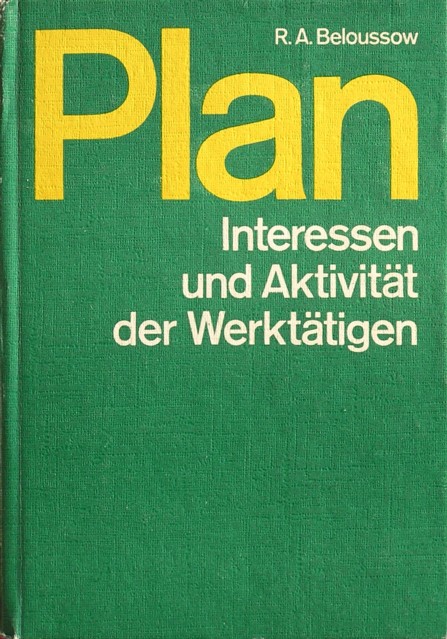

The book Plan, Interessen und Aktivität der Werktätigen has been written in the former Soviet Union, and was translated in the former GDR. Loyal readers of this portal know by now, that such books justify some distrust, because many Leninist textbooks are crammed with political propaganda. But although R.A. Belousov (in German Beloussow) was once an advisor of the Central Committee of the Leninist party, his story is credible and fairly objective. The title tersely summarizes the contents of the book, namely the systematics of the central economic planning in the Soviet Union. That theme is still relevant in our times. For, although the collapse of the Soviet Union under Gorbachev implied the burial of the centrally planned economy, during the past century many elements of economic planning have found their place in the market economies of capitalism.
After the industrialization under Stalin, during the post-war period the Soviet Union began the system competition with the capitalist states. She has undeniably succeeded with large projects: the development of the atomic bomb, nuclear energy, space travel, and the Tupolev-144. Incidentally, already during the war the Red Army defeated the capitalist Germany. The Leninist party has constantly tried to improve central planning. She attached importance to the reduction of the production costs, and has tried to solve this by restoring the incentives for profits. First in 1953 (the New Course), next in 1964 (the New Economic System), and finally in 1985 (the Perestroika), programs for economic reform are initiated. But each time the party gets stuck. Belousov writes his book in 1974, when the New Economic System has just failed.
The book (again bought in the storehouse of the Leninist second-hand bookshop Helle Panke in Berlin) gives an honest description of the then common planning policy. Thanks to this honesty it becomes clear that there is much internal disagreement. Some want to reduce the production costs by introducing real markets, and others want to intensify the planning. Apparently Belousov himself is undecided, which sometimes affects his arguments. These moments are obviously especially fascinating for the interested outsider1.
For the rest, Belousov gives a clear explanation of the Leninist principles for a just society. It notably becomes clear that the party top is convinced, that its rule is completely compatible with the human nature. In Leninism the human properties would optimally develop. Just like the western economy, the Leninist economy wants to maximally satisfy the needs by means of the available productive resources. Man has by nature a variety of material needs. But there are also psychic and social needs. and these increase in importance as a result of the human progress. The Leninist regime is well suited precisely for such immaterial needs. Belousov strongly identifies the human unfolding with labour. It is not a coincidence, that in Leninism the employment is guaranteed2.
Central planning is the best way to harmoniously coordinate and reconcile all individual and group interest. If desired, the behavioural patterns can be controlled by means of advertising and propaganda. Furthermore, Belousov has high expectations with regard to improvements in the plan-discipline. But he also complains that enterprises give too much priority to quantity above quality. The product prices must become more realistic, so that the market can function. This furthers the efficiency. But precisely because politics is so emphatically present in the economy, the enterprises have a culture of manipulation of the profit- and productivity-data. Belousov acknowledges, that human behaviour can hardly be planned. Nevertheless, he sees huge advantages in the use of long-term plans. However, the plans must be limited to the general course. The alert reader wonders how this can be reconciled with the plan-discipline!
In many places Belousov mentions failures. For instance, he acknowledges that the industrial mechanization was supposed to be completed already in 1965. This plan did not succeed. Here it does not concern incidental faults, but apparently a principled failure of the whole social control model. Each hierarchical layer must control itself, but the higher layers are not able to limit their own interventions. The product prices are determined centrally by politics, so that they lose their meaning as market indicators. Belousov hopes, that this can be changed by stimulating sound labour morals. Here Belousov again gets stuck in contradictions, namely those of participation and plan realization. In such moments he escapes in Leninist dialectics. Again he praises the profit motive, and at the same time complains about the unrealistic price system. Commands and indirect economic incentives must reinforce each other. Competition is healthy, as long as it is self-inflicted.
This goes on and on. The enterprises benefit from the plan-stability, but the plans must often be corrected. Belousov advocates a free market for equipment, in the form of a wholesale trade. However, the planning requires that the state dictates the investments at the central level. Although Belousov advocates an efficient industrial management, he also believes that the direction has political responsibilities. Your reviewer is willing to acknowledge, that any economic policy will always have many sides. And if the Leninist planned economy had functioned well in practice, then the ambiguity could have been tolerated. However, she functioned poorly.
On the contrary, for the well-meaning people the bad performance of the centrally planned economy was a continuous irritation. And Belousov illustrates this with many convincing examples. When he wrote his book, actually all economic indicators already supported giving up central planning3. Rigorous reforms were unavoidable. But Belousov refuses to come to that ultimate conclusion. That makes his book both surreal and fascinating.